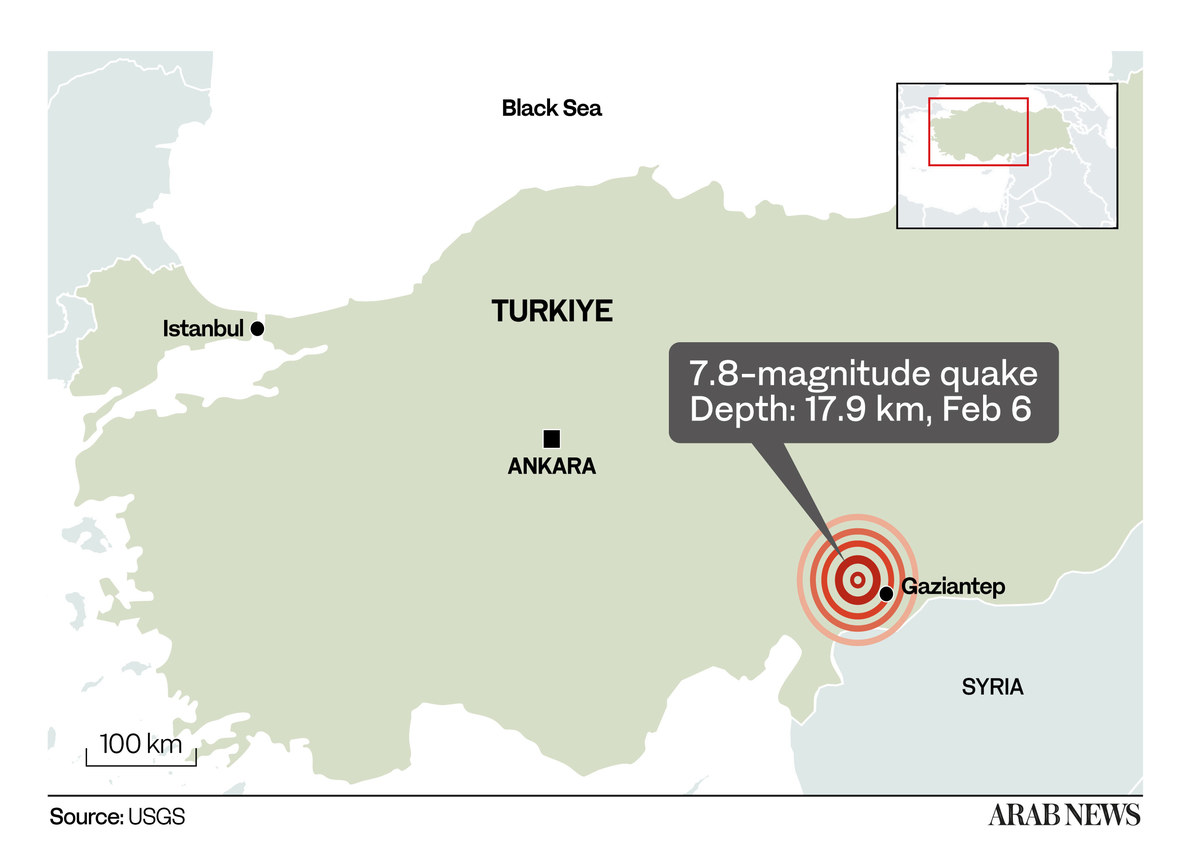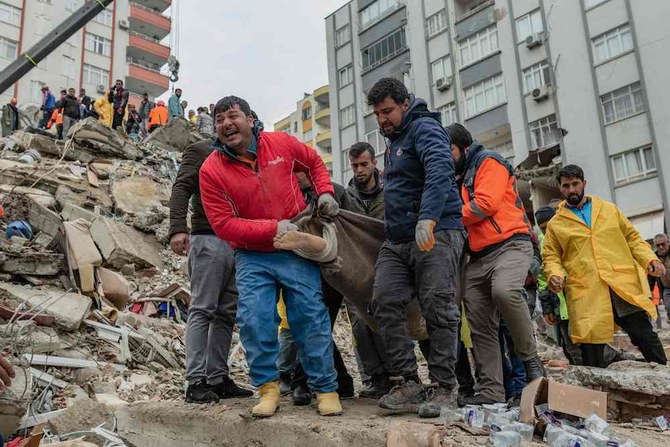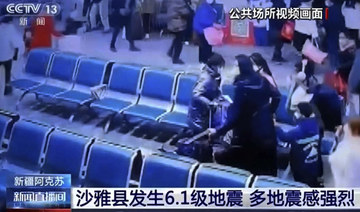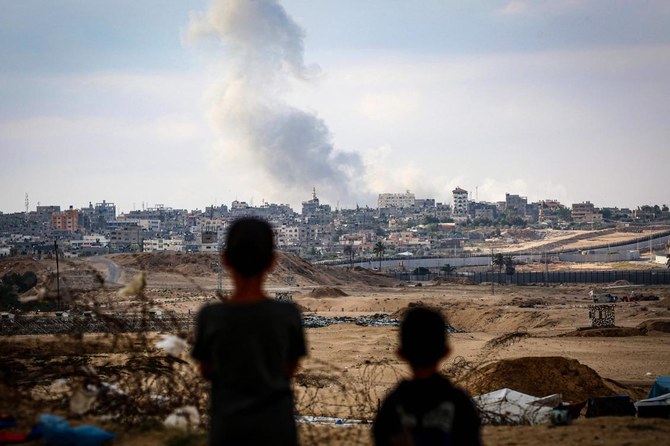ANKARA: A second earthquake of at least 7.5 magnitude rocked Turkiye and neighboring Syria less than 12 hours after the border areas were hit by a quake measuring 7.8, killing more than 3,400 people, with many others missing or injured on Monday morning.
The 7.8-magnitude quake struck just after 4 a.m. local time on Monday, 23 kilometerseast of Nurdagi, Gaziantep province, at a depth of 24.1 kilometers, according to data from the United States Geological Survey.
Churches, hospitals and residential tower blocks are among the hundreds of buildings razed to the ground - their occupants trapped under the rubble, caught unaware by the massive quake.
The second quake struck at 1:45 p.m. local time.
Tremors from aftershocks continued throughout the day and were felt as far as Beirut in Lebanon and in Iraq's Duhok and Erbil.
Officials in Turkiye said the official death toll stood at 2,379, with 14,483 people injured. Although, both figures were expected to rise.
Meanwhile in Syria, the number was placed at more than 1,500 dead according to officials in government-held and rebel-held areas.
The 7.8-magnitude quake struck just after 4 a.m. local time on Monday, 23 kilometerseast of Nurdagi, Gaziantep province, at a depth of 24.1 kilometers, according to data from the United States Geological Survey.
The earthquake caused devastation across both sides of the Turkish-Syrian border claiming hundreds of lives.
The quake was so strong that tremors were felt in Lebanon, Jordan, Israel and Egypt.
A hospital in the southeastern Sanliurfa province was completely destroyed by the earthquake, with many patients remaining trapped beneath the rubble.
Rescue workers and residents frantically searched for survivors under the rubble of collapsed buildings in various cities on both sides of the border. In one quake-struck Turkish city, people frantically pulled away chunks of concrete and twisted metal. People on the street shouted up to others inside a partially toppled apartment building, leaning dangerously.
Berivan Gokoglu, an engineer, was involved in rescue efforts in Sanliurfa's Yenisehir district with her medic husband, and told Arab News: “We rescued one old lady from the fifth floor of a building along with two children, but now we cannot rescue any one living, we are out of hope.”
She continued: “Many of these buildings have columns removed when shopping malls are constructed on the first floors, the most damaged buildings have been those which had shops on the first floor as they lacked columns to support the building.”
In the Turkish city of Adana, one resident said three buildings near his home collapsed. “I don’t have the strength anymore,” one survivor could be heard calling out from beneath the rubble, as rescue workers tried to reach him, said Muhammet Fatih Yavus a resident.
Further east in Diyarbakir, cranes and rescue teams rushed people on stretchers out of a mountain of pancaked concrete floors that was once an apartment building.
(The above video was made by Misel Uyar, Iskenderun/Hatay)
Aftershocks followed throughout the day, Turkish authorities said, until the second quake hit, of at least 7.5 magnitude.
Ozcan Karakoc, a teacher in a state-run school in Diyarbakir, ran to the school building when he felt the first quake.
He joined others in the humanitarian efforts in a sports facility next to the school building, providing blankets and food to those who were rescued from the debris of collapsed buildings.
The school is situated in the relatively low income Baglar district, one of the worst-hit areas of the earthquake.
“I live in Seyrantepe district of Diyarbakir where buildings were relatively new and we didn’t have so much damage inside the houses. But the building next to our school is old and about eight-storeys tall, where more than 200 people were living. It collapsed like a paper tower in seconds,” Karakoc told Arab News.
This unverified video was posted on Twitter
Like many Karakoc now waits for news from his students who are living in regions of Diyarbakir affected by the quake, mostly from Baglar. He is concerned that some of them might be trapped in the debris.
In Diyarbakir the streets are full of anxious people of all ages, including children, in pajamas and braving the freezing temperatures outside.
Diyarbakir resident, Berrak Demirel, was sleeping when the earthquake struck the city. She walked out of her home, with her husband and children, after the second aftershock of the first quake.
She said they waited for several hours outside, adding: “But had to come back home due to the freezing weather conditions in the city. Everyone was frightened, especially children in the middle of dark streets and turmoil,” she told Arab News.
In Syria’s cities of Aleppo and Hama to Turkiye’s Diyarbakir, more than 330 kilometers to the northeast the first quake caused buildings to topple to the ground.
Also in Syria, the first quake smashed opposition-held regions that are packed with some 4 million people displaced from other parts of Syria by the country’s long civil war. Many of them were already living in destitute conditions with little health care, with Russian-backed Syrian forces surrounding the area and sometimes carrying out airstrikes. Rescue workers said hospitals in the area were packed.
“We fear that the deaths are in the hundreds,” Muheeb Qaddour, a doctor, said by phone from the town of Atmeh, referring to the entire rebel-held area. Raed Salah, the head of the White Helmets, the emergency organization in opposition areas, said whole neighborhoods were collapsed in some areas.

The quake, felt as far away as Cairo, was centered north of the city of Gaziantep in an area about 90 kilometers from the Syrian border.
On the Turkish side, the area has several large cities and is home to millions of Syrian refugees.
Turkish President Recep Tayyip Erdogan said on Twitter that “search and rescue teams were immediately dispatched” to the areas hit by the quake.
“We hope that we will get through this disaster together as soon as possible and with the least damage,” he wrote.
Interior Minister Suleyman Soylu urged people not to enter damaged buildings due to the risks. “Our priority is to bring out people trapped under ruined buildings and to transfer them to hospitals,” he said.
At least 130 buildings tumbled down in Turkiye’s Malatya province, neighboring the epicenter, Gov. Hulusi Sahin said. In the Turkish city of Diyarbakir, at least 15 buildings collapsed. Rescue teams called for silence as they listed for survivors in a toppled 11-story building.
In northwest Syria, the opposition’s Syrian Civil Defense described the situation in the rebel-held region as “disastrous” adding that entire buildings have collapsed and people are trapped under the rubble. The civil defense urged people to evacuate buildings to gather in open areas. Emergency rooms were full of injured, said Amjad Rass, president of the Syrian American Medical Society.
US President Biden directed USAID and other federal government partners to assess response options to the most affected areas in the Turkiye and Syria earthquake, National Security Advisor Jake Sullivan said in a statement on Sunday.
The US is profoundly concerned by the reports of the destructive earthquake, he said.
The US Geological Survey said the quake was centered about 33 kilometers from Gaziantep, a major city and provincial capital. It was centered 18 kilometers deep, and a strong 6.7 aftershock rumbled about 10 minutes later.
Syria’s state media reported that some buildings collapsed in the northern city of Aleppo and the central city of Hama.
In Damascus, buildings shook and many people went down to the streets in fear.
The quake jolted residents in Lebanon from beds, shaking buildings for about 40 seconds. Many residents of Beirut left their homes and took to the streets or drove in their cars away from buildings.
The earthquake came as the Middle East is experiencing a snowstorm that is expected to continue until Thursday.
Turkiye sits on top of major fault lines and is frequently shaken by earthquakes.
Some 18,000 were killed in powerful earthquakes that hit northwest Turkiye in 1999.
The earthquake came as the Middle East is experiencing a snowstorm that is expected to continue until Thursday.
This unverified video was posted on Twitter
Citizens from as far as Jerusalem and Beirut talked of being awakened by the strong shaking. "I live in Gaziantep, Türkiye. Was sleeping when it started. Absolutely terrifying," Nasip (@iam_nasib) commented on a video posted on Twitter.
"Felt it in Jerusalem," said Amy di Nardò (@amybellabella).
Sagittarius (@JRsagittarius) said he was in Beirut and the experience "was terrifying."
Karolingston (@karolingston) of Cyprus said he was awakened because "My bed was shaking."
"Felt it in Lebanon. It was a hell of a feeling!" chimed in CharbelRahmé (@charbelrahm_e)
Turkiye is in one of the world’s most active earthquake zones. Duzce was one of the regions hit by a 7.4-magnitude earthquake in 1999 — the worst to hit Turkiye in decades.
That quake killed more than 17,000 people, including about 1,000 in Istanbul.
Experts have long warned a large quake could devastate Istanbul, which has allowed widespread building without safety precautions.
A magnitude-6.8 quake hit Elazig in January 2020, killing more than 40 people. And in October that year, a magnitude-7.0 quake hit the Aegean Sea, killing 114 people and wounding more than 1,000.
(With Agencies)































